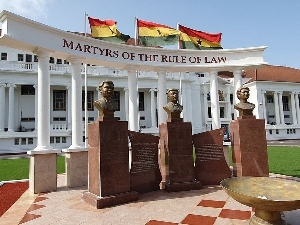- Home - News
- TWI News | TV
- Polls
- Year In Review
- News Archive
- Crime & Punishment
- Politics
- Regional
- Editorial
- Health
- Ghanaians Abroad
- Tabloid
- Africa
- Religion
- Election 2020
- Coronavirus
- News Videos | TV
- Photo Archives
- News Headlines
- Press Release
General News of Thursday, 4 July 2002
Source: GNA
Zero Tolerance for corruption is a political tool - Dr Aning
Dr Emmanuel Kwesi Aning, Fellow of African Security Dialogue and Research (ASDR), on Wednesday described the government's 'Zero Tolerance for Corruption' crusade as a political tool targeted at its opponents.
He said: "The crusade needs substantial amount of time before the New Patriotic Party (NPP) administration can demonstrate any significant obligation to zero tolerance for corruption among its own members as opposed to the corruption of its political opponents."
Dr Aning, who was delivering the second of a series of lectures at an International conference on: "States in Africa" organised by the Foundation for Security Development in Africa (FOSDA) in Accra said the government was yet to translate the crusade from a "increasingly ridiculed and empty political phrase into a substantive set of specific implementing policy measures."
The conference under the theme: "The State of Africa: Re-invention, Re-thinking, Re-construction and Reconstitution," focused on a new wave of governance with emphasis on re-invention and re-thinking of the continent's democratic and developmental processes.
The conference was attended by African Academics both on the continent and in the Diaspora, parliamentarians, government officials and members of civil society groupings. Dr Aning said; "so far, the crusade is increasingly being perceived by social commentators as a political tool targeted at former ministers, opposition party functionaries, actions and activities of the National Democratic Congress regime."
Speaking on: "A Case Study Of Ghana Towards Re-inventing And Rebuilding The Ghanaian State For A New Triumphalism, "Dr Aning suggested that national political leaders should be committed to the significant transformation of the principles, laws and structures through Ghana's history, culture and legal framework and institutions.
He said the process of transformation must be based on consultation with governmental agencies, civil society groupings, political parties and other stakeholders in national development agenda. On Ghana's economy, Dr Aning described it as most critical and sensitive problem for government, but lauded the willingness of stakeholders to go the extra mile to make the new democratic transitional process a success.










